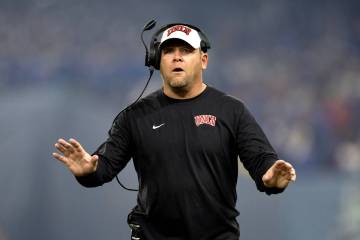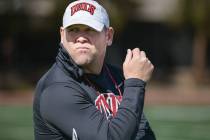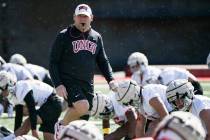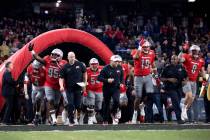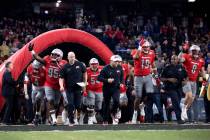Texas Christian off to Big East; UNLV: MWC still ‘strong’
The spring was such a promising time for the Mountain West, which seemed on its way to becoming an automatic qualifying conference for the Bowl Championship Series.
Boise State had been accepted into the league, and there were even hopeful rumors of some Big 12 Conference schools jumping to the MWC.
Now, in the late-autumn chill, the Mountain West is left looking more like a glorified Western Athletic Conference, especially after Texas Christian announced Monday it is leaving the MWC for the Big East on July 1, 2012.
TCU's exit will follow the departures of Utah (to an expanded Pac-12) and Brigham Young (football independent) in 2011, moves that were announced during a summer full of conference upheaval across the collegiate athletic landscape.
"I can understand the decision (by TCU), but can't help feel that if we had retained all current members that we would now be in a strong position as one of the premier leagues in the country," UNLV president Neal Smatresk said in a text message.
"We will continue to be a strong conference, though, with the addition of Boise, UNR, Hawaii and Fresno."
Boise State joins the Mountain West next year, and UNR and Fresno State enter the MWC in 2012. Hawaii is expected to join as a football-only member in 2012, but the agreement is still not official.
All four are members of the WAC, and it's doubtful the combined effect of their additions to the MWC will make up for the schools that the conference is losing.
The impending exits of Utah and BYU played a role in TCU looking elsewhere, Horned Frogs athletic director Chris Del Conte said.
"I'll tell you one thing about the Mountain West, it's a wonderful conference, but it's not the same conference we joined," Del Conte said.
Lack of national TV exposure was also a factor, and UNLV athletic director Jim Livengood said TCU's departure further underscores the Mountain West's need to re-evaluate its TV deals.
"I think it clearly is a signal," Livengood said. "I don't think there's any question about that."
The conference left ESPN in 2006 for CSTV, now CBS College Sports. It also formed its own network, The Mtn.
Being off ESPN, arguably the most influential network in sports, has created division within the Mountain West. TCU won't have to worry about TV exposure after it joins the Big East.
"The opportunity to be on ESPN, the exposure for our programs, is phenomenal," Del Conte said.
The Horned Frogs, ranked third in the BCS standings with a 12-0 record and a possible chance to play for the national title, join a conference in which winning the Big East title ensures a BCS spot. In the Mountain West, TCU had to go unbeaten to ensure a high enough ranking, and even then no bid was guaranteed.
It's also an important move for the Big East, which is considered weaker in football than the Mountain West and was in possible danger of losing its BCS status.
"The Big East was in a very vulnerable position," Livengood said. "I don't know if they could've gone forward without adding somebody like a TCU."
So now the Mountain West has decisions to make. Its athletic directors will have a previously scheduled conference call this morning, and its presidents and chancellors will be in regular contact.
Does the Mountain West, which will probably be at 10 football members in 2012, stand pat or expand to 12 or more schools? Until this year, the MWC took a cautious approach to expansion that might have damaged the league during the conference realignment free-for-all.
"Today's intercollegiate athletics environment is very fluid," conference commissioner Craig Thompson said in a statement.
"We appreciate the many contributions TCU has made to the growth and development of the Mountain West over the past six years. We look forward to shaping the future of the Conference in the coming months."
Contact reporter Mark Anderson at manderson@reviewjournal.com or 702-387-2914.





